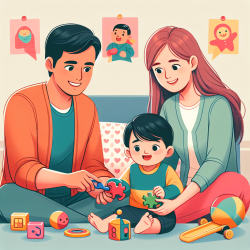Understanding Parental Responsiveness to Enhance ASD Therapy
The recent study titled "Differential responses to child communicative behavior of parents of toddlers with ASD" provides valuable insights into how parental responsiveness can significantly impact the social and communication skills of children with Autism Spectrum Disorder (ASD). This research underscores the importance of responsive parental interaction, highlighting its role in the development of children with ASD. As practitioners, understanding these dynamics can enhance therapeutic outcomes and guide interventions.
Key Findings from the Study
The study involved 77 toddlers with ASD, aged 18-39 months, and analyzed parental responses to their communicative behaviors. The key findings are:
- Responsive Interaction: Parents were generally responsive to their toddlers' communication, using a greater variety of words when responding to coordinated communicative behaviors.
- Coordination of Behaviors: When toddlers coordinated multiple communicative behaviors, such as vocalizations with eye gaze, parents were more likely to respond responsively.
- Impact on Social Skills: Parental responsiveness, particularly to gaze-coordinated communication, was significantly correlated with improvements in the child's social skills, although not directly with communication skills.
Implications for Practitioners
These findings suggest several actionable strategies for practitioners:
- Focus on Eye Gaze: Encourage parents to respond to their child's eye gaze as it is a critical component in eliciting responsive interactions that enhance social skills.
- Enhance Parental Responsiveness: Train parents to recognize and respond to coordinated communicative behaviors, which can lead to more effective interactions and better developmental outcomes.
- Early Intervention: Implement early parent-mediated interventions that emphasize mutual gaze and responsive communication to foster social development in children with ASD.
Encouraging Further Research
While this study provides a foundation, further research is necessary to explore the long-term effects of parental responsiveness on communication skills and to examine cultural variations in parental interaction styles. Practitioners are encouraged to contribute to this growing body of research by observing and documenting the effects of different parental interaction strategies in diverse populations.
Conclusion
The study reinforces the bidirectional relationship between child communicative behaviors and parental responses, highlighting the importance of responsive interaction in the development of children with ASD. By focusing on enhancing parental responsiveness, particularly through coordinated behaviors like eye gaze, practitioners can significantly improve the social outcomes for children with ASD.
To read the original research paper, please follow this link: Differential responses to child communicative behavior of parents of toddlers with ASD.










